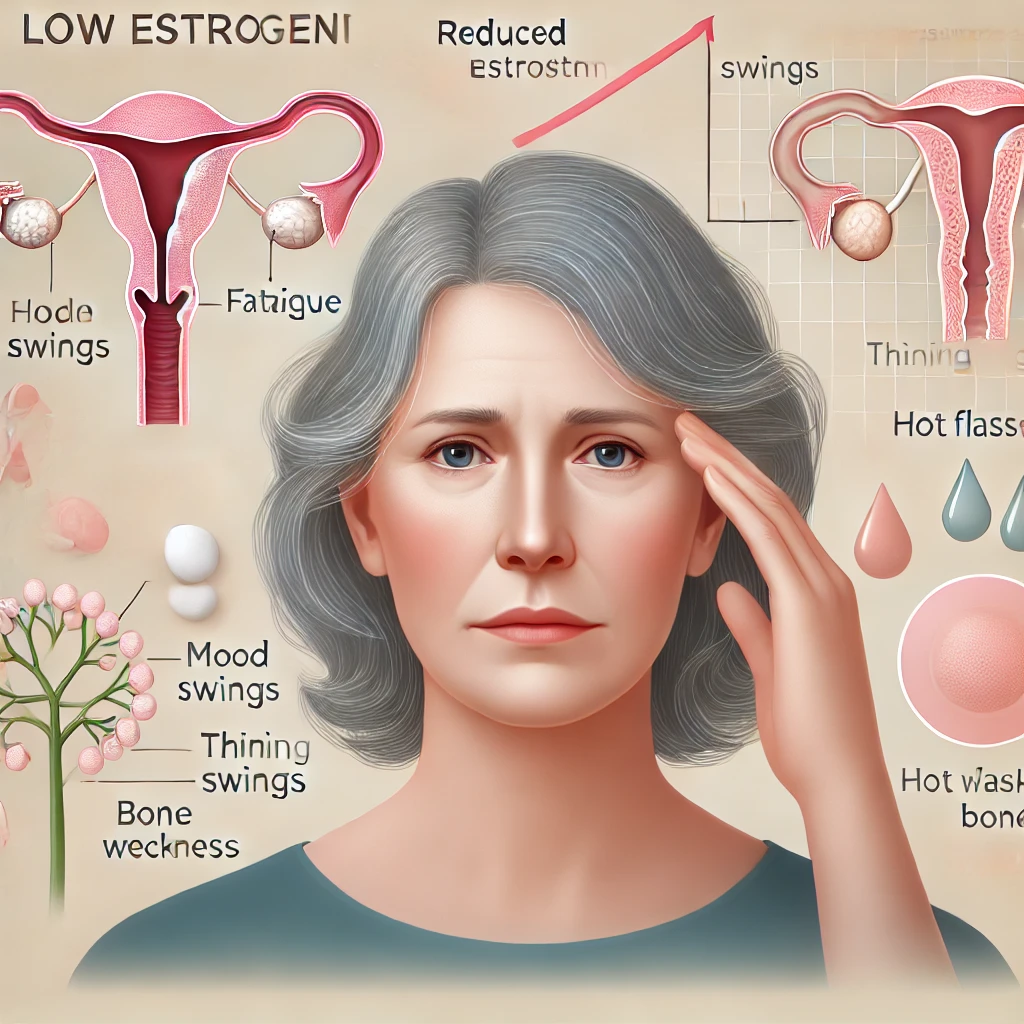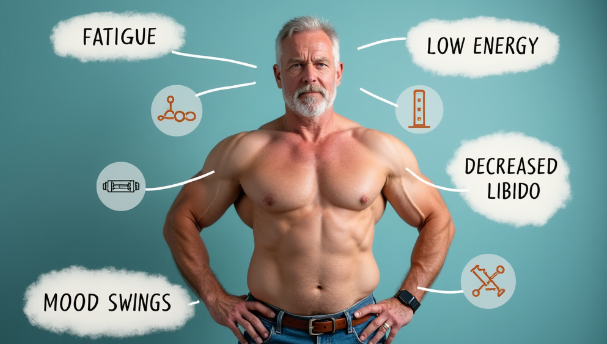Hormones are essential chemical messengers that regulate nearly every function in the body, from energy levels and mood to metabolism and reproductive health. When hormone levels drop or become imbalanced, it can lead to noticeable symptoms that affect daily life and well-being.
Recognizing signs of insufficient hormones, such as fatigue, mood changes, and physical discomfort, can be the first step toward understanding and addressing underlying health issues. Early awareness and treatment are key to restoring balance and improving quality of life
Insufficient hormone levels can significantly impact your health and quality of life. Recognizing the signs early is crucial for timely intervention and treatment. This article will guide you through the common indicators of hormone deficiencies, their potential causes, and available treatment options.
Table of Contents
Key Takeaways
- Hormonal imbalances can affect both men and women at any age
- Common signs include fatigue, weight changes, mood swings, and sleep issues
- Low testosterone in men may cause decreased libido and muscle mass
- Women with low estrogen often experience hot flashes and vaginal dryness
- Thyroid hormone deficiency can lead to weight gain and cold sensitivity
- Proper diagnosis requires comprehensive blood tests and medical evaluation
- Treatment options range from lifestyle changes to hormone replacement therapy
Understanding Signs of Insufficient Hormones

Hormones are chemical messengers that regulate various bodily functions. When their levels fall below the normal range, it can lead to a host of symptoms and health issues. Hormone imbalances can occur in both men and women and may affect people of all ages.
The Role of Hormones in Your Body
Hormones play a vital part in maintaining your overall health. They control metabolism, growth, reproduction, mood, and even sleep patterns. When hormone levels drop, these functions can be disrupted, leading to noticeable changes in your body and well-being.
Common signs of insufficient hormones Deficiencies
Several hormones can become deficient, each causing specific symptoms. The most frequently seen deficiencies include:
- Testosterone in men
- Estrogen in women
- Thyroid hormones
- Growth hormone
- Cortisol
Signs of Low Testosterone in Men
Testosterone is the primary male sex hormone. Its deficiency can lead to several noticeable changes in a man’s body and behavior.
Physical Changes
Men with low testosterone may experience:
- Decreased muscle mass and strength
- Increased body fat, especially around the midsection
- Reduced bone density, increasing the risk of osteoporosis
- Hair loss or thinning
Sexual Function and Libido
Low testosterone levels often affect a man’s sexual health, causing:
- Reduced sex drive
- Erectile dysfunction
- Decreased semen volume
- Fertility issues
Mood and Cognitive Changes
Testosterone also influences mood and cognitive function. Men with insufficient levels may notice:
- Increased irritability or mood swings
- Difficulty concentrating
- Memory problems
- Decreased motivation or self-confidence
signs of Insufficient Hormones: Indicators of Low Estrogen in Women

Estrogen is crucial for female reproductive health and overall well-being. When levels drop, women may experience various symptoms.
Menstrual Irregularities
Low estrogen can cause changes in menstrual patterns, such as:
- Irregular periods
- Lighter or heavier flow than usual
- Missed periods (amenorrhea)
Menopausal Symptoms
Women approaching menopause or those with premature ovarian insufficiency may experience:
- Hot flashes and night sweats
- Vaginal dryness and discomfort during intercourse
- Urinary tract infections
Bone Health and Physical Changes
Estrogen plays a vital role in maintaining bone density. Low levels can lead to:
- Increased risk of osteoporosis
- Joint pain
- Reduced breast fullness
Thyroid Hormone Deficiency Signs
The thyroid gland produces hormones that regulate metabolism. An underactive thyroid (hypothyroidism) can cause various symptoms.
Metabolic Changes
People with low thyroid hormone levels may notice:
- Unexplained weight gain
- Difficulty losing weight despite diet and exercise
- Slower heart rate
- Constipation
Energy and Temperature Regulation
Thyroid hormones affect energy levels and body temperature. Deficiency can lead to:
- Persistent fatigue
- Increased sensitivity to cold
- Muscle weakness
Skin and Hair Changes
Hypothyroidism can also affect appearance, causing:
- Dry, coarse skin
- Brittle nails
- Hair thinning or loss
Growth Hormone Deficiency Indicators
Growth hormone is essential for childhood development but also plays a role in adult health. Insufficient levels can cause:
- Decreased muscle mass and strength
- Increased body fat, especially around the waist
- Reduced exercise capacity
- Impaired bone density
Cortisol Deficiency Signs
Cortisol, often called the “stress hormone,” is crucial for various bodily functions. Low levels can result in:
- Extreme fatigue
- Low blood pressure
- Dizziness upon standing
- Nausea and vomiting
- Salt cravings
Common Symptoms Across Multiple Hormone Deficiencies
Some symptoms are common to various hormone imbalances and may indicate a need for further investigation.
Fatigue and Low Energy
Persistent tiredness that doesn’t improve with rest can be a sign of several hormone deficiencies, including thyroid, cortisol, and sex hormones.
Mood Changes and Depression
Hormonal imbalances often affect mental health, leading to:
- Mood swings
- Anxiety
- Depression
- Irritability
Sleep Disturbances
Many hormone deficiencies can disrupt sleep patterns, causing:
- Difficulty falling asleep
- Frequent waking during the night
- Poor sleep quality
Weight Changes
Unexplained weight gain or difficulty losing weight can be associated with thyroid, cortisol, and sex hormone imbalances.
Diagnosing Hormone Deficiencies
If you suspect a hormone imbalance, it’s essential to seek medical evaluation. Diagnosis typically involves:
Comprehensive Blood Tests
Blood tests can measure hormone levels and identify deficiencies. Your doctor may order tests for:
- Thyroid hormones (TSH, T3, T4)
- Sex hormones (testosterone, estrogen, progesterone)
- Cortisol
- Growth hormone or IGF-1
Physical Examination
Your healthcare provider will perform a thorough physical exam to look for signs of hormone imbalances and rule out other potential causes of your symptoms.
Medical History Review
A detailed medical history can help identify risk factors and potential causes of hormone deficiencies.
Treatment Options for Hormone Deficiencies
Treatment for hormone imbalances depends on the specific deficiency and its underlying cause. Options may include:
Hormone Replacement Therapy
Hormone replacement therapy (HRT) involves taking medications to restore hormone levels to a normal range. This can include:
- Testosterone replacement for men
- Estrogen therapy for women
- Thyroid hormone replacement
- Growth hormone injections
Lifestyle Modifications
In some cases, lifestyle changes can help improve hormone balance:
- Regular exercise
- A balanced diet rich in nutrients
- Stress management techniques
- Adequate sleep
Nutritional Supplements
Certain supplements may support hormone production and balance:
- Vitamin D
- Omega-3 fatty acids
- Zinc
- Magnesium
When to Seek Medical Help
It’s important to consult a healthcare provider if you experience persistent symptoms of hormone imbalance. Seek immediate medical attention if you have:
- Severe fatigue or weakness
- Rapid weight loss or gain
- Extreme mood changes or depression
- Chest pain or difficulty breathing
Preventing Hormone Imbalances
While some hormone changes are a natural part of aging, you can take steps to maintain hormone balance:
- Maintain a healthy weight
- Exercise regularly
- Manage stress through relaxation techniques
- Avoid excessive alcohol consumption
- Limit exposure to endocrine-disrupting chemicals
The Impact of Hormone Deficiencies on Quality of Life
Hormone imbalances can significantly affect your daily life and overall well-being. Understanding the signs and seeking timely treatment can help you maintain optimal health and vitality.
| Hormone | Primary Functions | Common Deficiency Symptoms |
|---|---|---|
| Testosterone | Muscle mass, bone density, sex drive | Decreased libido, fatigue, muscle loss |
| Estrogen | Reproductive health, bone density | Hot flashes, vaginal dryness, mood swings |
| Thyroid Hormones | Metabolism, energy regulation | Weight gain, fatigue, cold sensitivity |
| Growth Hormone | Cell growth and regeneration | Decreased muscle mass, increased body fat |
| Cortisol | Stress response, metabolism | Fatigue, low blood pressure, nausea |
| Age Group | Common Hormone Concerns | Recommended Screenings |
|---|---|---|
| 20s-30s | Thyroid function, fertility | Thyroid panel, reproductive hormone tests |
| 40s-50s | Perimenopause, andropause | Estrogen, testosterone, DHEA levels |
| 60+ | Thyroid, sex hormones, growth hormone | Comprehensive hormone panel, bone density scan |
- Lifestyle factors that can affect hormone balance:
- Chronic stress
- Poor sleep habits
- Unhealthy diet
- Lack of regular exercise
- Environmental toxin exposure
By staying informed about the signs of insufficient hormones and taking proactive steps to maintain hormonal health, you can improve your overall well-being and quality of life. Remember to work closely with your healthcare provider to develop a personalized approach to hormone balance that takes into account your unique needs and medical history. Feel free to visit our website or contact us now to take the first step towards a healthier, more active lifestyle!


